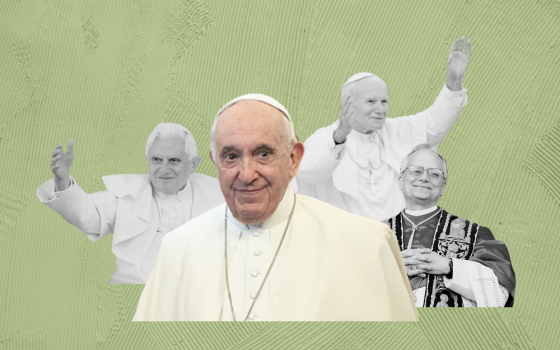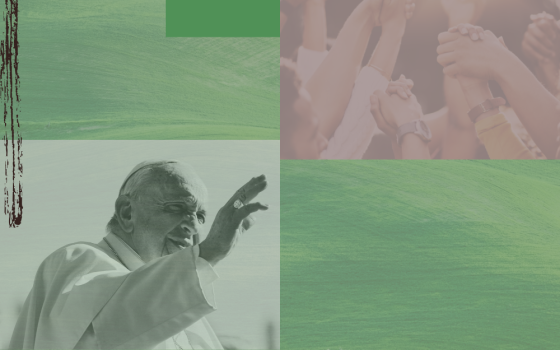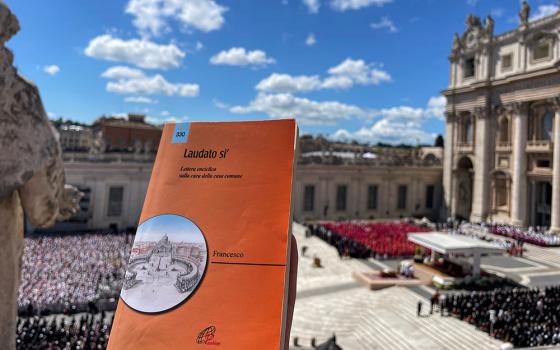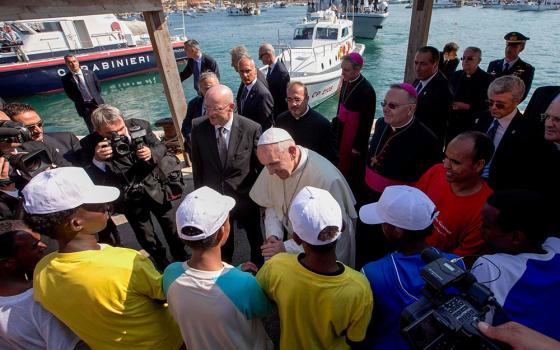Pope Francis reaches out to comfort an inmate as she sheds tears after the Holy Thursday Mass on March 28, 2024, at Rebibbia Prison on the outskirts of Rome. (CNS/Vatican Media)
Pope Francis spent his final days on earth doing many of the things he loved: praying at the Salus Populi Romani icon at the Basilica of St. Mary Major — his final earthly resting place — greeting tourists at St. Peter Basilica and taking the popemobile for a final spin in St. Peter's Square on Easter Sunday.
He also went to jail.
Don’t worry, the late Holy Father didn’t commit a crime in his final days. But he did spend some time on Holy Thursday making a visit to the inmates at Regina Coeli prison. The visit was a trademark surprise from the "Pope of Surprises," as he was not feeling well enough to participate in the traditional Holy Thursday foot washing — which he conducted each year among incarcerated communities.
Until his dying breath, Pope Francis made it his mission to spend time with those on the margins — in this case, prisoners.
Spending time with those incarcerated at the prison remained important to him even if he couldn’t participate in his usual Holy Thursday tradition.
"I like to do every year what Jesus did on Holy Thursday, the washing of the feet, in prison," Pope Francis said to the 70 or so inmates at this audience. "This year I cannot do it, but I can — and I want to — be close to you. I pray for you and for your families."
During the first year of his pontificate, he washed the feet of youth at the Casal del Marmo youth detention center. In 2018, he chose Regina Coeli Prison — the same place as his final Holy Thursday visit. And last year, he visited Rebibbia Prison, breaking with tradition in choosing to wash women inmates' feet only.
Rebibbia Prison was also the site of another break in tradition at the hands of Pope Francis. During Jubilee Years, four Holy Doors are opened throughout the city of Rome at the four major papal basilicas: St. Peter's, St. Mary Major, St. John Lateran and St. Paul Outside the Walls. But Pope Francis decided to open a fifth Holy Door in the city: at Rebibbia.
Advertisement
While taking center stage recently, care for the incarcerated was an integral part of Pope Francis’ pontificate. In fact, they merited a mention in his Declaration on Human Dignity, also known as Dignitas infinita.
"The glorious Christ will judge by the love of neighbor that consists in ministering to the hungry, the thirsty, the stranger, the naked, the sick, and the imprisoned, with whom he identifies," the Holy Father wrote, referencing the Gospel of Matthew. "For Jesus, the good done to every human being, regardless of the ties of blood or religion, is the single criterion of judgment."
Within the same document, he also mentioned the death penalty as a "grave violation of human dignity," referencing back to his encyclical Fratelli tutti in which he wrote, "The firm rejection of the death penalty shows to what extent it is possible to recognize the inalienable dignity of every human being and to accept that he or she has a place in this universe. If I do not deny that dignity to the worst of criminals, I will not deny it to anyone."
In his care for the incarcerated, the late Holy Father shows us the extent to which Christian love can — and should — be shared with the world. Many of us have known hunger and thirst, so it may be easier for us to give food to the hungry and drink to the poor. Fewer of us, however, have had firsthand experiences of prisons — whether incarcerated ourselves, through a loved one or by participation in prison ministry. And so, it may be understandably more difficult to show love and care to the incarcerated, especially when they’ve committed serious crimes.
Nevertheless, Pope Francis demonstrated that the incarcerated must be a part of our pastoral outreach. It certainly isn’t a coincidence that the Holy Thursday feet-washing ritual he conducted each year with the imprisoned is traditionally known as the "Mandatum," from which we get the root of the English word "mandate."
And what is this mandate? It is from Christ himself in the Gospel of John, when he washes the feet of his apostles at the Last Supper: "I have given you a model to follow, so that as I have done for you, you should also do."
During his last night on earth, Jesus washed the feet of his disciples. During one of his final days on earth, Pope Francis visited the incarcerated. May we follow their model, and as they have done for us, we should also do.







